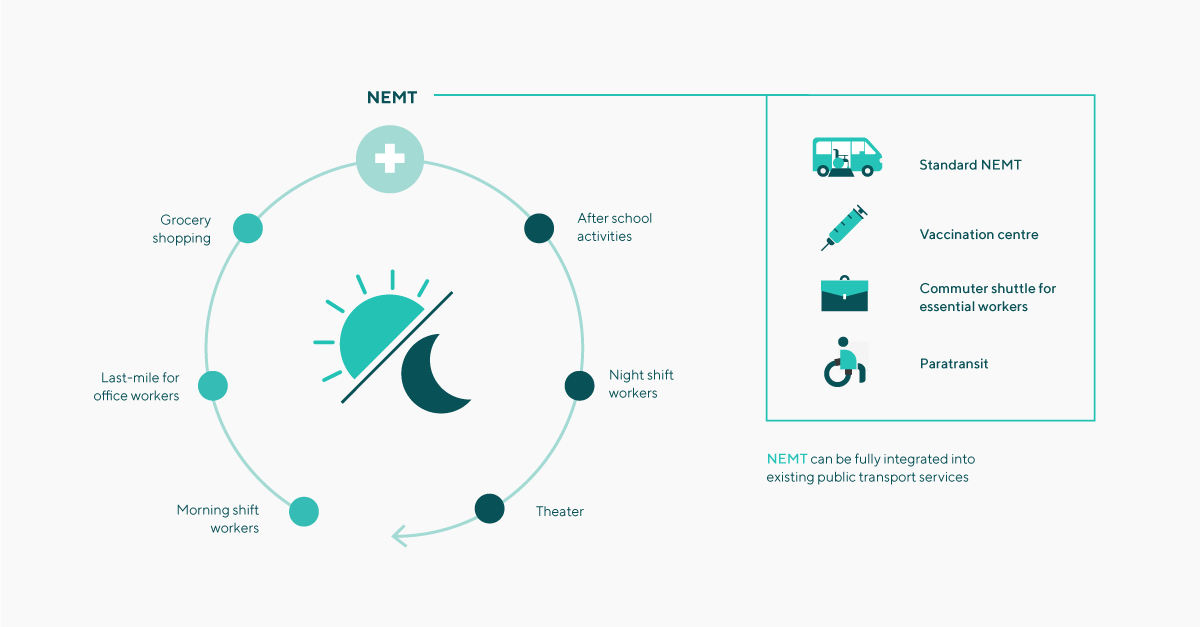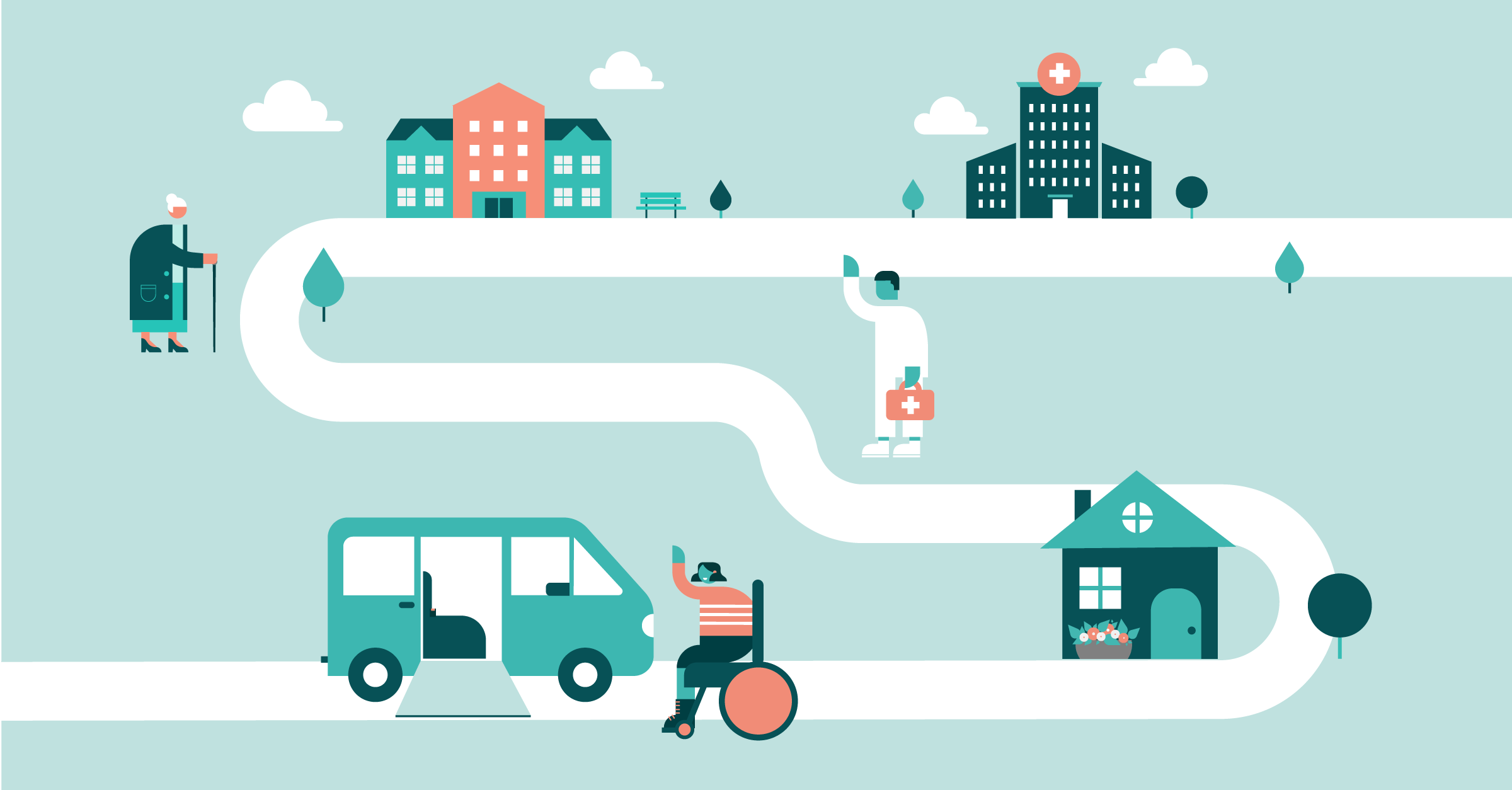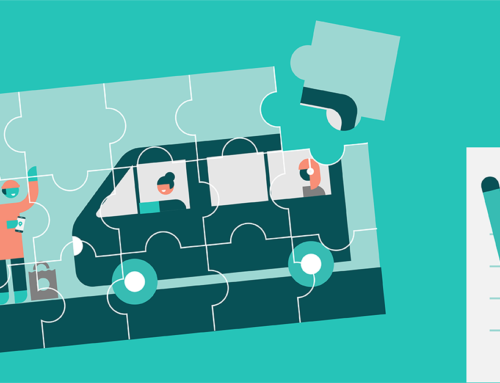Right now, the world is reeling from the effects of the coronavirus pandemic. It has spread to almost every country in the world, and its proliferation has made national economies and enterprises calculate costs like never before. Especially in times of heightened awareness about public transport and the spread of the virus, safe, flexible, on-demand transport solutions need to be provided for citizens. Non-emergency medical transportation (NEMT), the fastest-growing segment of all medical transportation industries, is a viable answer to this.
What is NEMT?
Non-emergency medical transport (NEMT) is a transport service that brings individuals who are not in an emergency situation to their medical appointments. NEMT supports not just regular primary care visits, but a range of services, such as recurring treatments, physical therapy and mental health appointments. The availability of reliable and accessible transport is critical to both patients and healthcare providers.
Challenges NEMT stakeholders face
Patients face several challenges when it comes to keeping their medical appointments. Those with the most limited options in keeping appointments are often the elderly or from low-income households. Compounding this is the fact that taxi costs are unsustainable for regular appointments (including for dialysis and preventative service appointments), especially among those patients from a lower income group. In Germany, the number of dialysis patients is increasing annually by 2.7% while the number of specialists is decreasing annually by 8%, which means there is going to be an even higher demand for flexible and accessible NEMT services in the near future.¹ Booking and rescheduling a NEMT ride can sometimes be challenging for patients due to its predominantly analogue form of coordination. For those that can afford driving a car to their appointments, unpredictable parking costs and availability can generate stress and financial anxiety. It is no surprise that only about half of the patients who do actually have access to a car wind up using it to go to medical appointments.
Ultimately, millions of people either delay or miss healthcare appointments each year due to a lack of flexible and accessible transportation options. These no-shows may worsen the patient’s symptoms and lead to a deterioration of health in the long term. But not only patients, also healthcare providers face numerous challenges in this area. No-shows cost the US healthcare system $150 billion each year.² Delays in appointments have serious financial consequences for the entire medical system and can lead to increased need for preventative hospitalizations or emergency care.
What’s more, hospitals often face difficulties in managing large numbers of patient trips efficiently throughout the system. 47% of medical transport trips are carried out by taxi as single trips in Germany.³ In 2016, the expenditure on these types of medical trips already grew to €1.2 billion.⁴ The lack of digitalized trips and reporting to optimize transport services places economic pressure on the entire system. In addition, a lack of transparency for billing and reporting could lead to long-term economic pressure.
Software solutions for these challenges
door2door ridepooling software solutions bring numerous advantages for the NEMT stakeholders mentioned above. For the patient, on-demand NEMT services provide them with flexible and reliable booking processes through digitalization and visually accessible functions. Post-surgical patients who cannot drive their own car or board public transport, e.g. due to a cast, are also given a convenient option. Our wheelchair booking function can guarantee a wheelchair-accessible seat on the trip in advance. Pre-booking functions can also free patients from the stress of looking for parking while the clock is ticking to be at an appointment on time. For these and many other customer journey challenges, NEMT software solutions are the answer.
For medical service providers and/or NEMT providers, digitalized reporting and billing can increase efficiency and save costs in the long term. Our comprehensive BI Reporting tool can provide insightful learnings from past trips in order to optimize future ones. Moreover, our Passenger app or Telephone Booking Service can minimise repeated calls to reschedule appointments and facilitate NEMT services. Optimized transportation can also save costs for hospitals as patients can be discharged at the required time. This means that previously full beds can be opened for new patients in a timely manner.
As a strong partner to public transport, at door2door we believe supplementary use cases for ridepooling services, including medical transport, can be integrated into an existing fleet of clean, comfortable and reliable vehicles, thereby reducing the risk of additional investment. This makes the existing ridepooling service more versatile, and leads to increased efficiency in the quality and availability of both services. In coronavirus times, optimized use of existing vehicle fleets for patient transport could even be expanded to include transport options for those seeking Covid-19 testing or vaccinations. Our ridepooling API can be integrated into existing public transport services and we have the technical expertise and experience to integrate these use cases easily and successfully.

In the end, automated pooling of medical trips leads to increased efficiency, as fewer vehicles transport the same number of patients, shorter overall travel time through more efficient routing and last but not least, a sense of community. At door2door, we support NEMT services to ensure that all healthcare patients can get to and from their appointments without stress or anxiety. Our aspiration is to ensure this harmony: We want to continue to develop technology and services that combine the reliability of public services with the power of innovation and convenience for everyone.
Footnotes
- https://www.gesundheit-adhoc.de/studie-100000-dialysepatienten-bis-ins-jahr-2020-experten-fordern-mehr-patientenbeteiligung-und.html
- https://www.hcinnovationgroup.com/clinical-it/article/13008175/missed-appointments-cost-the-us-healthcare-system-150b-each-year
- https://de.statista.com/statistik/daten/studie/408917/umfrage/gkv-rettungsfahrten-und-krankentransporte-nach-verkehrsmittel/
- https://www.bbgundpartner.de/fileadmin/Media/Dokumente/Beitrag_Baumeister.pdf



